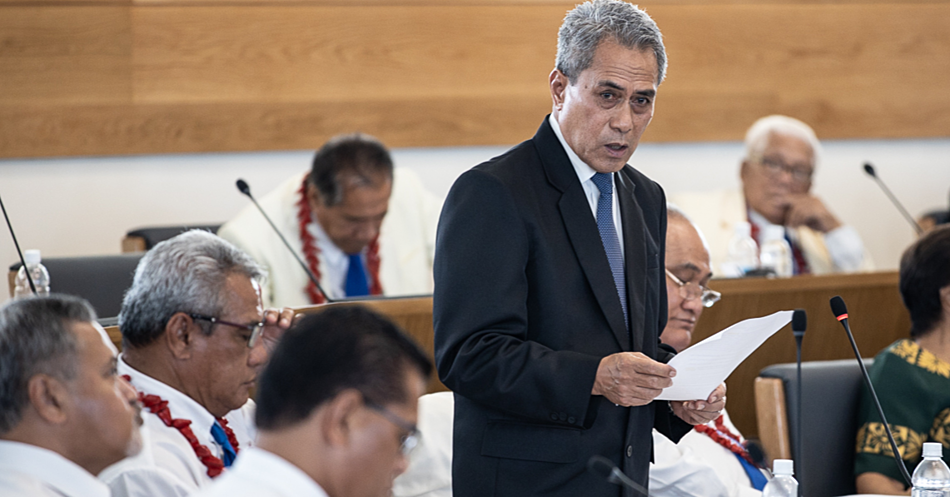The evolution of Samoa's anthem
 By Sialai Sarafina Sanerivi
•
30 October 2024, 12:00PM
By Sialai Sarafina Sanerivi
•
30 October 2024, 12:00PM
Academic Rita Seumanutafa-Palala, nearing the completion of her PhD in Ethnomusicology, has provided invaluable insights into Samoa's national anthem and its evolving lyrics.
There is growing controversy on which version of the anthem should be used.
She has illuminated the narrative surrounding the anthem's original composition and subsequent amendments.
The national anthem, composed by Sauni Iiga Kuresa in 1948, emerged as a significant cultural symbol.
"It was the winning submission of 15 entries when they were searching for their first anthem," Mrs Palala shared.
Kuresa, a beloved and respected figure within the Seventh Day Adventist Church, was known for his contributions to church brass bands and choirs. He was given the title "Malotutoatasi" as an acknowledgement of his service to Samoa.

"So the original version of the national anthem has two verses in it," Mrs Palala said.
She accompanied her insights with a photograph of the original sheet music confirming Kuresa's initial version contained two verses.
While the first part of the anthem remains unchanged, amendments were made to the second part over time.
The original lines, "Va'ai i na fetu, o lo'o agiagia ai, o le faailoga lea, o Samoa ua mafai, ona tautai" (Oh see and behold the stars on the waving banner; They are a sign that Samoa is able to lead) and "Aua e te fefe e le toe avea lou pale" (Do not be afraid; never again your crown shall be taken), were revised by Kuresa himself.
The revised lines read, "Va'ai i na fetu o lo'o agiagia ai, O le faailoga lea o Iesu na maliu mo Samoa" (Look at those stars that are waving on it: This is the symbol of Jesus, who died on it for Samoa.) and "Aua e te fefe; o le Atua lo ta fa'avae" (Do not be afraid as you are founded on God).
"Just by looking at the [original] lyrics, these are very important. It's a window into the frame of their minds at the time."
She pointed out that this period preceded Samoa's independence, a time marked by a growing desire for self-governance.
The lyrics reflect a collective sentiment of readiness to reclaim authority. However, the changes arose due to criticism regarding the original version's religious undertones. Many believed it needed a stronger Christian emphasis, prompting revisions by Kuresa.
"The version sung at C.H.O.G.M. was from the 1986 arrangement by Ueta Solomona, a prolific composer of pese lotu and a well-known church leader at the time, and he arranged Kuresa's verse."
Mrs Palala noted that Solomona’s rendition was more a re-arrangement than a completely new composition. He rearranged the order of lines and restored Kuresa's original phrase, "Samoa ua mafai ona tautai," omitting the reference to Christ.
Through her exploration of these changes, Mrs Palala aims to deepen the understanding of the anthem's historical context.
"But I hope this breakdown gave you guys a little bit of insight into our national anthem, and the history of and how it's changed over time," she stated.
She said the anthem serves as a "window into Samoan history" and reflects the collective mindset of its people during significant moments in their past.
Rita Seumanutafa-Palala, a graduate of the Melbourne Conservatorium of Music at the University of Melbourne, holds a Bachelor of Music (Honours) with First Class Honours (2013) and is currently completing her PhD in Ethnomusicology (2024). Her research focuses on Samoan musical traditions in the diaspora.
As a music educator, performer, and composer, she is also a nominee for the APRA-AMCOS award (2019) and actively mentors young Samoan musicians in community and church settings. Recently, she has joined the leadership team of the University of Melbourne’s Oceania Institute, where she will play a crucial role in its development during its formative years.
 By Sialai Sarafina Sanerivi
•
30 October 2024, 12:00PM
By Sialai Sarafina Sanerivi
•
30 October 2024, 12:00PM











